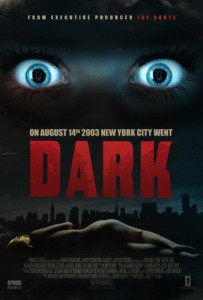
“You know when you look in the mirror and see yourself? And I mean really see yourself? I didn’t like what I seen, so I quit!”
It is stunted dialogue such as that that holds “Dark” back from reaching its potential. That line of dialogue is spoken by Kate (Whitney Able) in response to why she quit modeling. The comment is deeper than that, explaining why she’s in the emotional rut she’s been in as of late; she hasn’t just quit modeling, but practically quit life itself. This is all fine and well in terms of drama, but the scripting of this dialogue, as well its delivery, undermines the emotion of it.
Kate is one of thousands of New Yorkers burdened by a massive blackout engulfing the city. For her, this poses a great threat, and it’s not the fear of muggers or serial killers on the prowl, but herself. The blackout forces her to battle her inner demons and come to grips with her loneliness. A loneliness not brought on by the act of being alone, mind you, as she’s in a relationship with Leah (Alexandra Breckenridge); one so serious that she just moved in with her. This loneliness is brought upon her feelings of inadequacy.
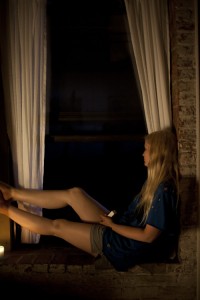
On the surface, “Dark” works well as a character study. The blackout, which could be used as a horror movie setup, is instead used as a metaphor on Kate’s mental state. In the beginning of the film, she seems lost, but with a glimmer of hope. She teaches yoga and is even hit on by one of her students, which, while the pass is denied, does make her feel wanted, harkening back to her glory days as a model. It’s when Leah leaves town for a few days and the citywide blackout occurs that Kate’s mental state shuts down. As the city goes dark, so does Kate.
Kate tries to fend off the loneliness by embarking on the town, dropping by a local bar to distract herself. She even dolls herself up in the hope of rekindling her past glory. This is fitting, considering she runs into her past in the form of Marco (Redman), a former friend who embodies the charisma she once had. It’s a shame Redman’s inclusion here is only as a glorified cameo, as his energy bounces off of Kate’s cold demeanor well, which could lead to many interesting scenarios. Alas, he is but a brief glimmer of light, much like the beginning of Kate’s day.
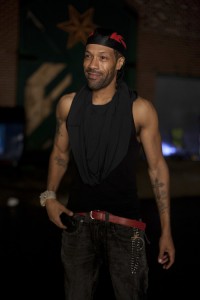
Kate bypasses Marco to enter the bar, which is when the dialogue quoted at the beginning of the review is uttered. Kate regales her past to Benoit (Michael Eklund), and this is where the film starts to stumble. Up to this point, Nick Basile directed the film with slight subtlety. Sure, there were lines of exposition to clue the audience in on Kate’s struggles, such as an argument with Leah, but nothing as overt as this. Kate, and ultimately the film, devolves from introvert to extrovert, no longer hiding the emotions, but putting them on full display. None of the dialogue spoken feels authentic, but written solely to explain the reasoning behind it. They say actions speak louder than words, with this being a fine example of that.
It is in this same troubling scene that Basile shows signs of promise as a director. There’s a shot of Benoit gently grabbing Kate’s hand, only to discover cuts on her wrists. She pulls back, slinking into her seat. As he goes to leave, she asks if she revealed too much, with the mystery being gone being the reason for his departure. It’s as if she’s speaking directly to the audience.
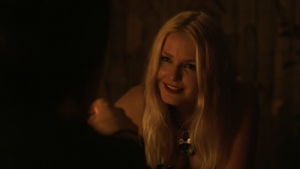
From there, the film stumbles about in finding itself. Sometimes it stumbles onto the right formula, such as Kate’s paranoia getting the best of her back in darkened apartment. Every footstep she hears throughout the loft sends her into a frenzy, but also acts as a distraction. It’s when things go quiet that the fight within herself comes out, as she slowly unravels. On the flip side, there are moments when she breaks down and once again explains her problems via exposition, such as her reasoning for moving to New York being “I thought I would find myself.”
It’s the lack of confidence in Basile that is the downfall of “Dark.” He never feels comfortable in allowing the actions to speak for itself. The film moves at a glacial pace, making me wonder if he feared the audience wouldn’t keep up. Therefore, via exposition and some horror tropes in the finale, he injects life into the proceedings. On the contrary, he sucks the humanity and existential dread out of the film, bogging it down with contrivances. Worst of all, this drags down Whitney Able’s performance at times, which is otherwise phenomenal!
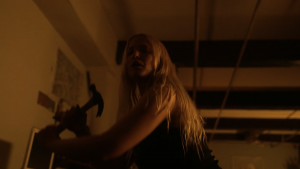
Nick Basile co-wrote “Dark” with Elias, who wrote and directed the far superior “Gut” from a few years ago. That film was also a character study, focusing on individuals watching a snuff film and their emotional state slowly spiraling out of control because of it. Much like this, that film started off slow, with the dread creeping up the longer the film went. The difference there was confidence in Elias’ direction. Basile shows the same promise, but isn’t quite there yet.
Final Rating: C+
Dark is currently in the festival circuit, available On Demand overseas, and will become available On Demand in the United States on June 7th.
